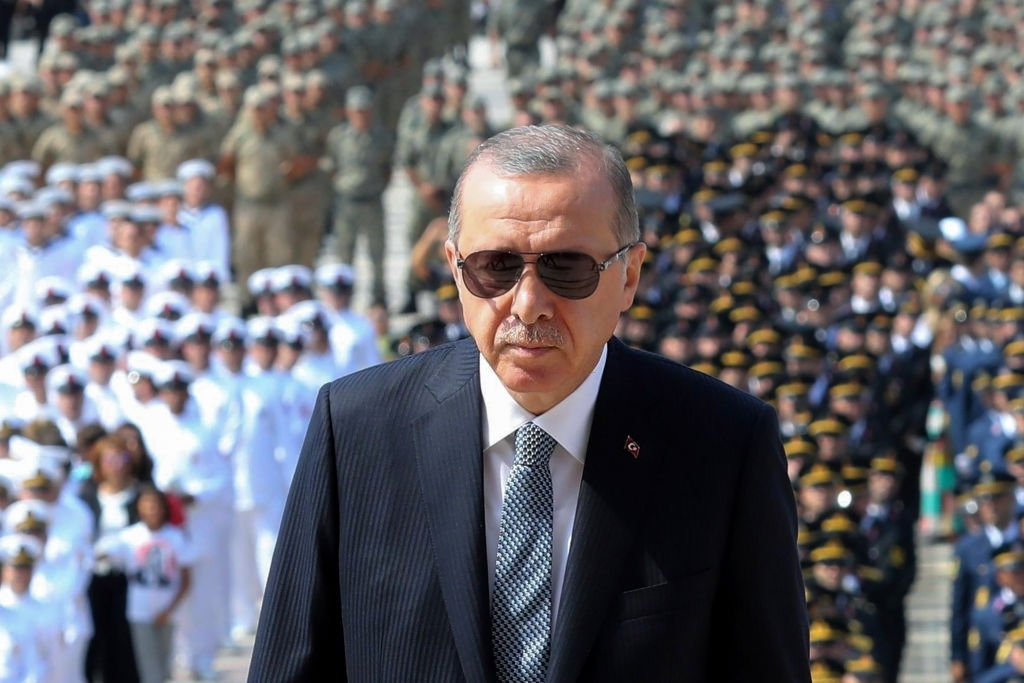Last week, officals from the ruling Justice and Development Party and Nationalist Movement Party declared that they had agreed on the draft of a constitutional change which proposes to shift current parliamentary system to an executive and partisan presidential system. The Party’s Group Deputy Chairmans Mustafa Elitas, Naci Bostanci and Mehmet Mus submitted the bill to Parliament Speaker Ismail Kahraman with 316 signatures, the total number of ruling party’s seats.
As everyone knows, changing the parliamentary system to a presidential system has been the primary political objective of President Recep Tayyip Erdogan for years. He always underlines that current political structure of Turkey is not suitable in terms of economic development, political stability, separation of powers and so on for the future of Turkey. Regardless of whether the arguments by Erdogan and his followers are consistent or not the most obvious question that comes to mind is this: Although Erdogan is the most powerful political actor and in control of the whole state instutions why does he want a presidential system?
There are two answers to the question. The first is Erdogan does not want to break off ties with his own Justice and Development Party. As a shrewd and highly talented politician, Erdogan is fully aware of the fact that cutting ties with the party will lead to the loss of political power for himself. Indeed, he is right completely because the conflict between presidents and prime ministers is an ordinary phenomenon in Turkish political history. The leaders who left their party and premiership after they were elected president begin to clash with their handpicked prime ministers. This is an inevitable consequence of the competition over the control of the executive branch of the goverment. Even if the both have similar set of attitudes, beliefs, sentiments and are willing to pursue same political agenda, somehow the confrontation occurs. When Turgut Ozal was elected as the eighth president of Turkey, he assigned his comrade Yildirim Akbulut to the Motherland Party’s (ANAP) chairmanship and prime ministry, but soon the disagreement over Gulf War strained their relationship. Then, Mesut Yilmaz who had the full support of Ozal and carried out important duties in the early years of ANAP was elected as the new chairman of the party in ANAP’S General Congress in June 1991. When Yılmaz became ANAP’s leader, he did not ask Ozal’s views on important policy decisions. Ozal’s authority on ANAP waned as a result of divergence of opinion with Yılmaz. This story is not unique. Turkey’s ninth president, Suleyman Demirel and his trustee prime minister Tansu Ciller also experienced the tension in their struggle for power. Actually there’s no need to go back that far, we have recently witnessed the conflict between Erdogan and former prime minister Ahmet Davutoglu. Although Davutoglu said he would remain loyal to the president he had to resign from his post due to divergence of opinion on some issues with Erdogan. Erdogan is quite aware of the fact that one day his alliance with the current prime minister Binali Yıldırım will also end similar to other examples in the history of modern Turkey. Thus he does not want to make the same mistake that the former leaders made. In order to achieve this goal he aims to control the party formally and directly, not via a custodian. But now, he is not a member of the party in accordance with the 1982 Constitution. I mean, he either needs a constitutional amendment that would allow the partisan presidency or presidential system.
The second answer is more complicated than the first one. Mustafa Kemal Ataturk, the founder of The Rebublic of Turkey, passed away 78 years ago but his deterministic position concerning the politics is still alive. His legacy has continued to dominate Turkish politics for so long. All the military coups and memorandums in Turkey took place in reference to him because Turkish Army has long seen itself as the guardian of Ataturk’s principles and revolutions. Even today, people who are against the goverments and Erdogan generally identify their ideology and life style with Ataturk. They proudly call themselves as the soldiers of Mustafa Kemal Ataturk. In fact, his influence involves not only politics but also everyday life. His name has been given to countless institutions, parks, streets, bridges and statues, busts and photos of him are easily found everywhere. Moreover Turkish Law 5816 protects his memory from insults and breaching that law is punishable by up to three years in jail. As as source of power and authority Ataturk’s legacy has been playing a central role in defining of forms of political existence and everyday life in Turkey.
Until Erdogan, no one had been able to challenge to Ataturk’s charisma. Most of the political leaders of Turkey said they would follow in Ataturk’s footsteps for the future of the country. But today, Erdogan heralds a new paradigm in the governance of Turkey. That is called “The New Turkey” which invokes the glorious days of The Ottoman Empire. The New Turkey aims to be one of the biggest key players in the of export, business, banking, finance, infrastructure, military defence systems and foreign policy both at the regional and global levels under the leadership of Erdogan.
Erdogan has huge amount of support among conservative Muslims, and these people believe that he is the only man who can take Turkey back to the glory of The Ottoman Empire. The word “Reis” (the chief) has become a common title for Erdogan among his supporters. Similarly, the term “Gazi” was a common word for Ataturk. And just like Ataturk, Erdogan is not interested only in governing affairs of a nation, but also in redifining Turkey’s history, literature, culture, etc. He criticized the Treaty of Lausanne which was considered to be a tremendous victory for Turkey for giving Aegean Islands back to Greece. Furthermore he gives messages about a broad spectrum of daily life such as the consumption of alcohol and tobacco, the type of bread to eat, the ideal number of children to have and so on.
All these things prove that Erdogan desires to build a new hegemony which covers the areas of history, culture, ideology, economy and politics. And if the constitutional change takes places, he will get closer to his goal.

